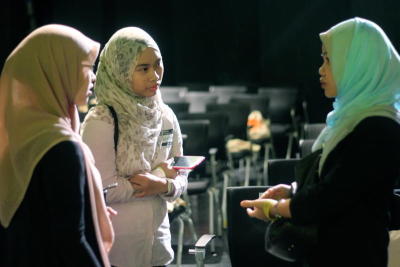By TRISTAN TOH
You’d have to be living inside a cave for the past few years if you know nothing about Upin & Ipin. This would be the only valid excuse for being clueless about the home-grown animated series that has made waves both locally and abroad.
With a box office haul of RM6.3 million for feature film Geng: Pengembaraan Bermula, primetime slots on Disney Channel Asia and reported plans to build a RM700 million theme park in Sepang, you can be forgiven for assuming that production studio Les’ Copaque had its success handed over on a silver platter.

Usamah Zaid, creative director of production studio Les’ Copaque, told students attending the workshop how the studio developed the highly-successful Upin & Ipin animated series.
Not so, said creative director Usamah Zaid. With its humble beginnings as a three-man team working in a closet-sized office, Les’ Copaque had to introduce many cost-cutting measures in order to meet stringent deadlines.
Among them was the removal of Upin and Ipin’s parents during the six-episode Ramadan special for TV9 back in 2007.
“Though we tried to circumvent the issue by explaining that the twins were staying with their grandmother for the holidays, sooner or later Mum and Dad are expected to appear,” said Usamah.
“So we inserted a scene of Upin and Ipin praying at a cemetery as it was easier than creating two new characters.”
All this and more were revealed by the speaker at [i]MPACT, a weekend gathering of some 200 students at Publika.
Organised by the United Kingdom and Eire Council (UKEC) of Malaysian Students, the event served to showcase diverse forms of positive action.
He added: “People often say that creativity comes from boundless freedom. In our case, it came from the restrictions imposed upon us.
“In the words of Randy Pausch, we cannot change the cards we are dealt, just how we play the hand.”
Zain HD, founder of flash mob collective Random Alphabets and social media consultancy Wago, was also present to engage the audience.
Criticising the corporate obsession with Return On Investment (ROI) and other such business jargon, he called on would-be youth leaders to instead emphasise collaboration and originality, two elements that must be balanced with a sense of relevance.
To illustrate, he recalled an incident when he was contacted by a company that merely wanted to jump on the flash mob bandwagon.
“Flash mobs are all well and good, but tell me exactly how they save kids in Africa?” he quipped.

Attendees were able to discuss some of their ideas for positive action with the workshop speakers, which included myHarapan general manager Nurfarini Daing (R).
Nurfarini Daing, general manager of myHarapan, was another speaker who appealed to the largely young audience.
She took the opportunity to expound upon her organisation’s mission to drive youth participation in nation-building efforts.
She dispelled the notion that the widening income gap between the haves and the have-nots limits the latter’s ability to contribute to society. Relating her experience of teaching French to village children in her university heyday, Nurfarini believes that everyone has something to offer, and it is up to them to make full use of it.
The rest of the speakers, which included writer Dina Zaman, EcoKnights founder Yasmin Rasyid, slam poet Elaine Foster, FnD Mindspot founder Effendy Norzaman, visual designer Muid Latif and vlogger Aiman Azlan – further fuelled the discussion of ideas among the attendees.
But without action, ideas will remain just that – ideas.
With that in mind, the talks were were followed by a round of workshops conducted by Wago, myHarapan and Foster.
Under the watchful eyes of a group of facilitators from various industry backgrounds, the participants were coached in their respective fields before venturing out on their own to organise their own community outreach initiative.
“[i]MPACT was borne out of a simple question: if we made change easy, would everyone then stand to make a difference?” explained project leader Ayne Zarof.
“And what better way to achieve this than by mingling with like-minded peers who are restless for it to happen?”

Tell us what you think!